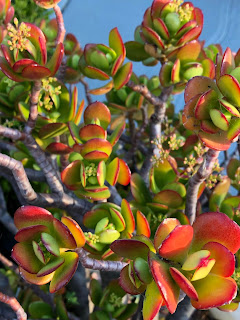I think the past few weeks have shifted my life - not dramatically, but subtlety. There is, of course, the continuing kitchen reconstruction. Our dining room table is still in the garage and the refrigerator resides in an otherwise empty dining room. At the end of next week, we will need to move out entirely for a few days. There is this cold and my subsequent loss of voice. For the past couple of years, most of the colds I have experienced have caused a voice loss. My speaking voice will croak its way back into existence, but my singing voice is always quite slow in returning. There is always that moment when I realize that I cannot speak, or speak very little. Singing is out of the question, and I do not feel comfortable serving Communion in such a state while also coughing and sneezing. At that point, my active ministry must come to a temporary close. This experience is a lesson in patience; I have to let healing happen in its own time. Yet, two friends have gently intervened. One friend dropped off some ginger and her recipe for ginger tea; another passed on some lemons. I have made use of both.
In addition, I have been reading My Journey to Lhasa written by Alexandra David-Neel and first published in 1927. It is impossible for me to describe this book. She was born in France in 1868, and even as a child she dreamed of going to a land of vast stretches of emptiness, high mountain peaks, and silence. These she found in Tibet, and she lived, studied, and traveled there for years. She was a learned Buddhist, lama, an opera singer, and speaker of several languages. At one point she decided to do a pilgrimage with her adopted son to Lhasa, which was closed to foreigners. She and Yongden "tramped" (her expression) on foot. She had to disguise herself as a peasant woman travelling with her son. To say they travelled lightly is quite the understatement. They crossed high mountain passes (I believe the highest was 19,000 feet), often eating very poorly, and sometimes not at all. They found shelter wherever possible. When a peasant family would extend hospitality, hygiene was frequently non-existent. Yongden, who also was a lama, could travel as a poor pilgrim lama and often served in that capacity to those they encountered. However, she could present herself only as a simple old peasant mother. She darkened her skin with grease, soot and dirt. She also darkened her hair, added yak hair braids, and topped her disguise off with a dirty hat. The several month, often perilous journey, which she usually referred to as an adventure, did culminate in Lahsa. She would eventually return to France and live to be over 100 years old.
While I do not see myself crossing mountain passes on foot, I find the idea of pilgrimages intriguing. For several years as a Lenten practice, I have read The Way of a Pilgrim, translated from Russian by R.M. French (the original author is unknown) and first published in 1930 (this past year was an exception as I decided to journey with Julian of Norwich). The Way of the Pilgrim is the story of a peasant who sets off to learn how to pray without ceasing. I think if we are paying attention, our very lives are pilgrimages, and perhaps that is the subtle shift I am experiencing. Advent often feels to me to be a reorientation, much like Lent. I am reminded that on this journey there is the unexpected, the joyful, the humorous (some of her observations are quite funny), and there are times when much courage is needed. Travelling light is highly recommended regardless of one's faith tradition.
Tibet has undergone many changes, including violence, genocide, destruction, and the exile of its spiritual leader. This edition includes a foreword written by the Fourteenth Dali Lama in 1992. I found this paragraph insightful and I think those of us in the western world would do well to contemplate these words:
"..for too long Tibet cherished its isolation. Foreigners were actively discouraged from entering the country. A sense of material and spiritual self-sufficiency allowed conservative elements among Tibetan policymakers to overlook the importance of friendship with the outside world. We paid a heavy price for this aloofness later." He added, "Sadly, due to changes imposed on the Land of Snows and its people in recent years, much of what David-Neel describes is lost forever, which only increases the value of her account."
I have yet to find a lotus of a thousand petals that I can actually photograph, so I dedicate this red rose to Alexandra David-Neel. I am grateful.
photograph: Oakland, November 2019





